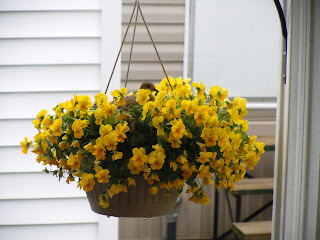So, after realizing that the loverbirds were here to stay, I did a little research on them. Here is what I found:
Mating Habits:
All doves in general follow similar courtship patterns. The males coo loudly, displaying before the females. At a more advanced stage of courtship the movements seem more like a bowing to the female. These displays sometimes go on for days, followed by nest building.
Nests are placed in shrubs and trees, relatively low. Doves prefer areas with tall hedges and thickets to woodlands. The male chooses the nesting site and gathers twigs, roots and other materials, which are set in place by the female.
These birds are monogamous and tend to mate for life. There are usually two eggs in each clutch, elliptical in shape and white, with a faint bluish tinge. Male and female share incubating duties for about 2 weeks after which the chicks are hatched nearly naked. These birds are altricial. The young can fly when they are three weeks old.
So, basically, these birds are too precious for words. They mate for life. The male chooses the nest. They share nesting duties.
That means, this male bird literally choose the PRETTIEST location for his love to build a nest. He then gathered the materials needed while she set up home. This knowledge made me feel even more guilty that I destroyed their first home. Andrew and I both agree that these doves are the bird version of us. Their "marriage" is too sweet, and I love how diligently this male sought out the most beautiful home for his love.
Today, I noticed that the female was not leaving the nest as much. She was not getting startled by me coming and going. I figured that she probably had laid her eggs. When I got back from Wal-Mart, I tried to not scare her off of her nest, but it was just too much commotion for her. I took this opportunity to see what was going on.
Sure enough, there are now eggs in this nest! True to research, my love birds are the proud parents to two eggs. I hope I get to see the babies before I move. It sounds like I should... they only incubate for two weeks or so. Then it takes another 3 weeks for them to fly. It would be cool if I were here for that as well.
It is funny that I now tiptoe around these birds so I don't disturb them. I felt really bad when I scared her off of the nest. I took that opportunity to water the plant; however, I had to do so quickly because she kept flying by. I might need to invest in protective head gear for that task!
Anyway...
She is now nestled safely back on her nest. I think she looks precious all snuggled in protecting her babies.
She doesn't rest easily though... her little head popped up when she heard the camera click. The daddy was on the ground eating, but he is now in protective mode on the shed roof.
What good parents! If only some human parents would be this mindful and protective of their young...




No comments:
Post a Comment